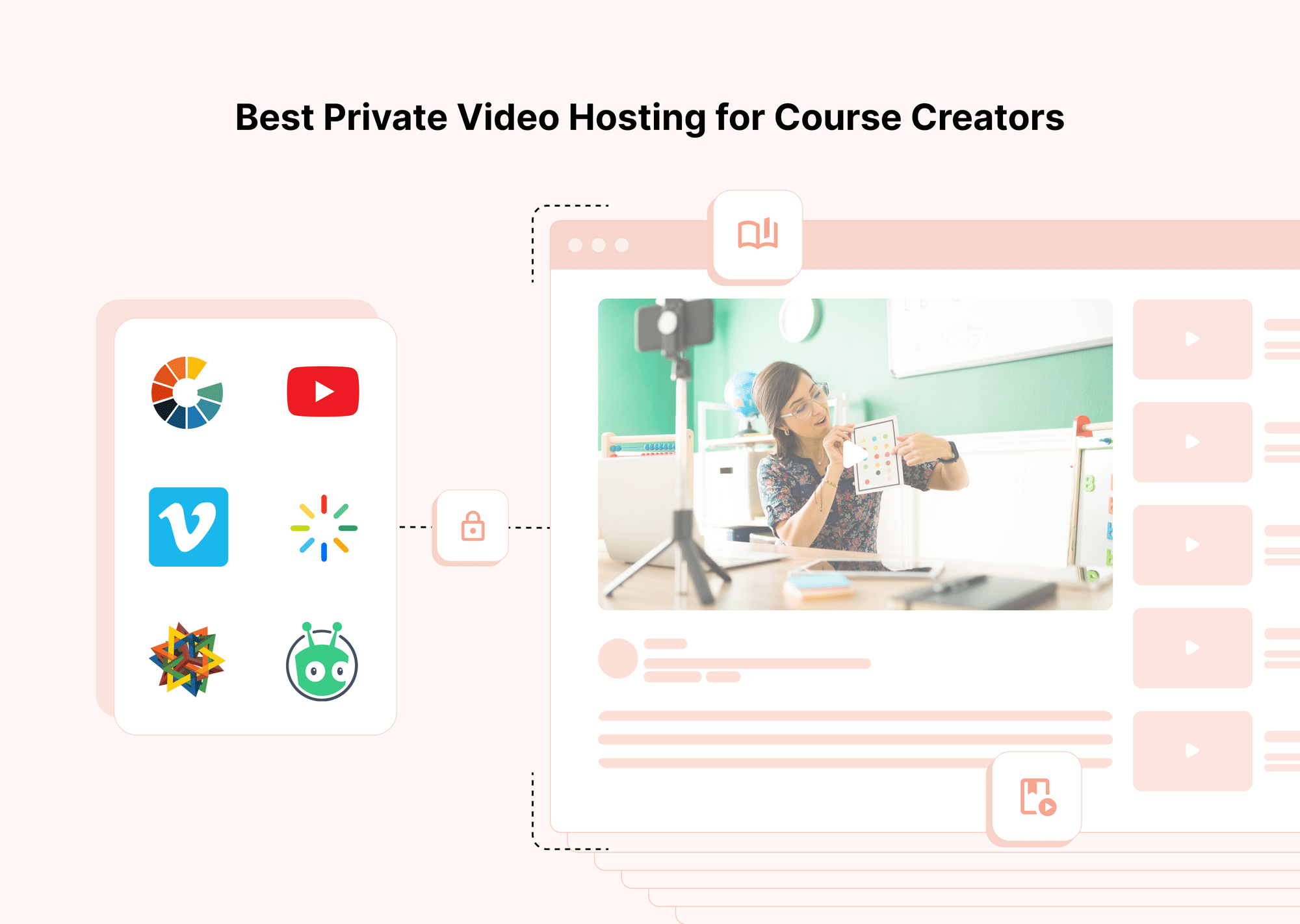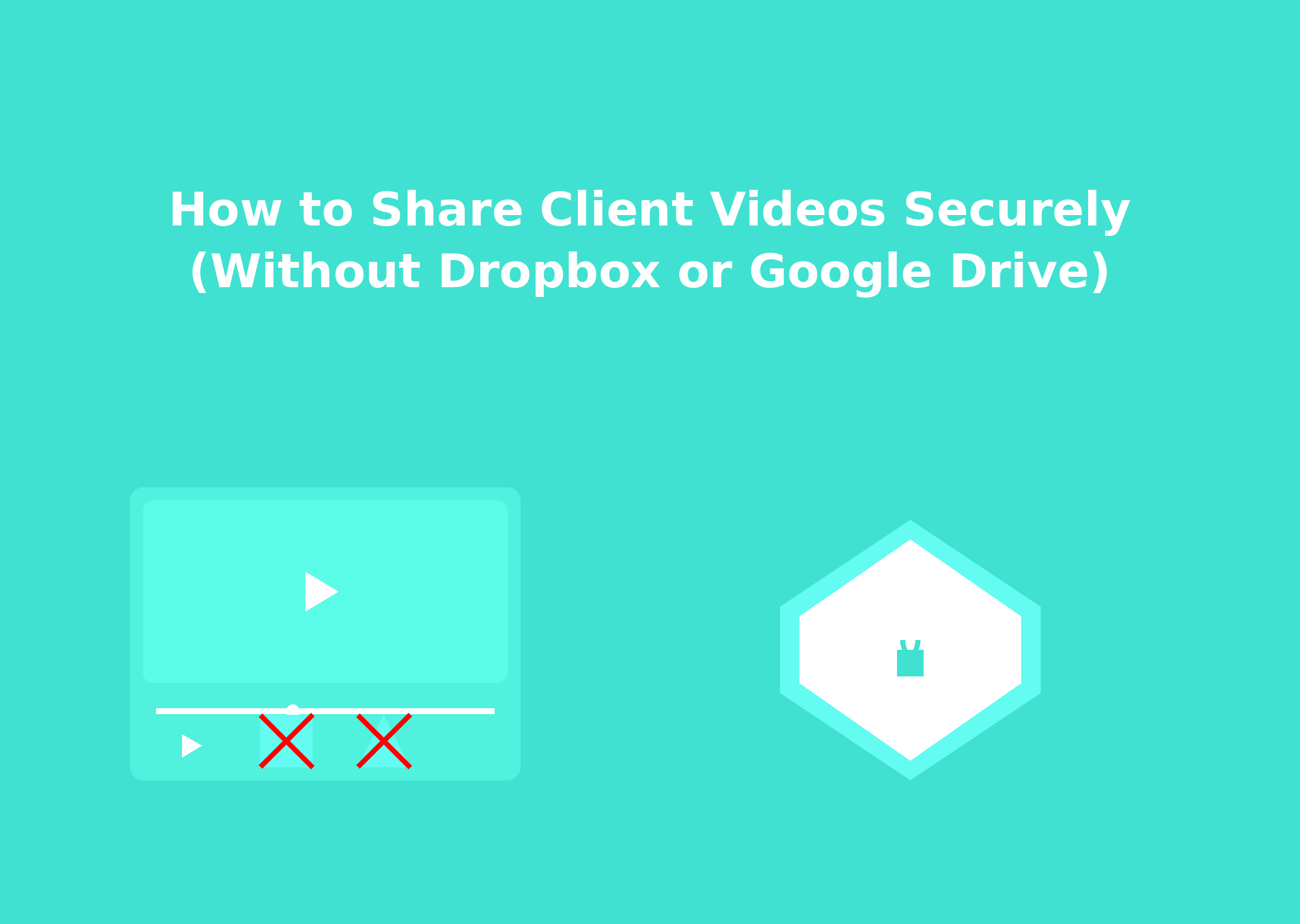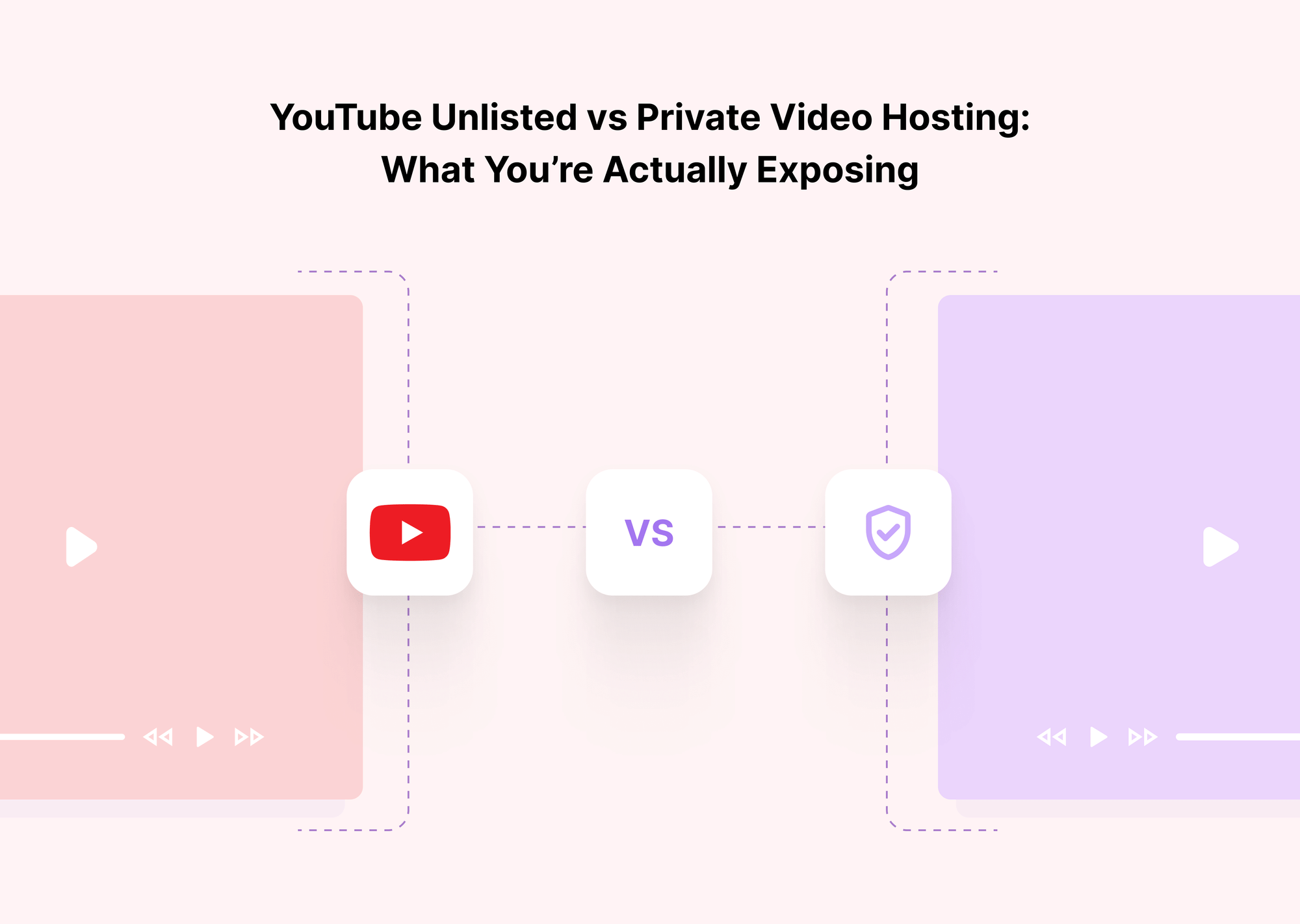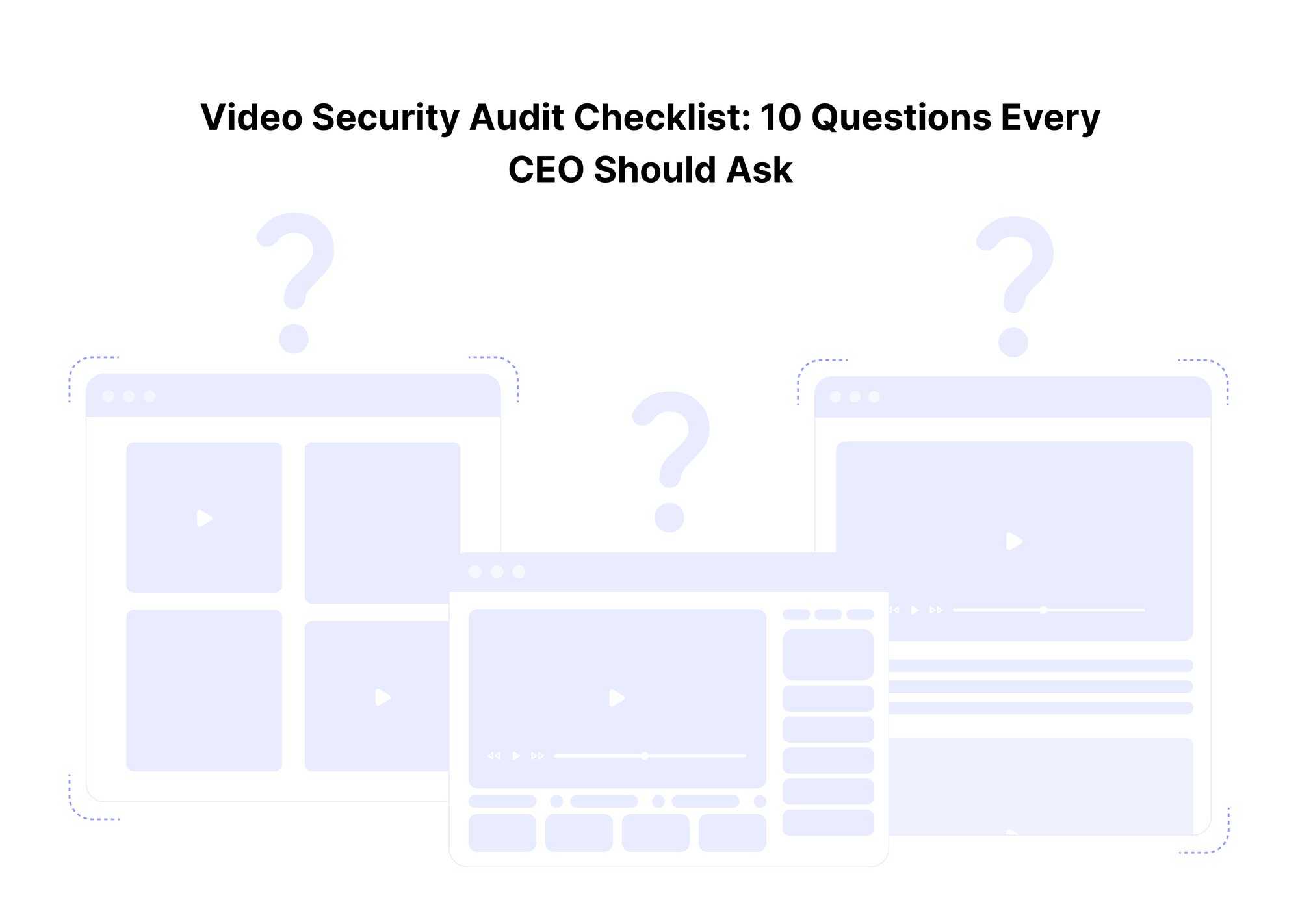Online education has become one of the fastest-growing industries worldwide, and video is at the heart of it. From structured e-learning programs to independent coaching modules, educators rely on videos to deliver lessons effectively.
In such a scenario, a reliable online video hosting platform allows creators to deliver high-quality lessons without interruptions, while a secure video hosting platform protects valuable content from piracy and unauthorized access. With so many video sharing platforms and video hosting platforms available, the challenge lies in selecting the best fit for course creators in 2026.
Why Secure Video Hosting Matters for Course Creators
For course creators, video is the backbone of their work. Each lesson, walkthrough, or demo represents hours of preparation, recording, and editing. With so much time and intellectual property invested, leaving content unprotected exposes it to piracy, unauthorized downloads, and misuse. As online education continues to grow into a multi-billion-dollar industry, the risks have never been higher.
Secure video hosting platforms ensure that learners enjoy seamless streaming while protecting creators’ rights. Technologies such as DRM encryption (Widevine, FairPlay), token authentication, and signed URLs act as strong barriers against unauthorized sharing. When learners know that a platform takes security seriously, it builds trust not only in the content but also in the brand delivering it.
Consider this: creators who upload premium courses to open platforms like YouTube risk having them ripped and resold, often at a fraction of the price. Such piracy doesn’t just cause revenue loss - it undermines credibility. By adopting a secure video hosting platform, educators protect their intellectual property while preserving brand integrity and ensuring that learners can access courses safely and without disruptions.
Comparing Top Private Video Hosting Platforms
When evaluating video hosting platforms for online courses, security, performance, and cost-effectiveness should lead the decision. Below is a comparison of the leading options:
| Platform | Security Features | Performance & Delivery | Cost & Accessibility | Best For |
|---|---|---|---|---|
| Gumlet Video | DRM (Widevine, FairPlay), dynamic watermarking, token-based access, signed URLs | Adaptive bitrate streaming, global CDN, real-time analytics, customizable ad-free player | Flexible pricing, developer-first APIs/SDKs, strong support | Course creators seeking enterprise-grade protection with cost-effective plans |
| VdoCipher | Strong DRM, dynamic watermarking, anti-piracy focus | Stable streaming, but fewer customization options | Moderate pricing; limited branding flexibility | Educators prioritizing DRM-first delivery |
| Vimeo OTT | Basic security, no enterprise DRM | Large user base, OTT monetization, global delivery | Higher pricing for premium features | Media houses and creators tied to the Vimeo ecosystem |
| Wistia | Password protection, limited piracy controls, no DRM | Excellent branding tools, customizable player, marketing analytics | Mid-to-high pricing; marketing-oriented plans | Businesses blending courses with marketing campaigns |
| Brightcove | DRM, watermarking, enterprise-level security | High scalability, robust integrations, adaptive streaming | Expensive; suited for enterprises | Large institutions and corporations with big budgets |
| Kaltura | DRM, watermarking, IP/domain restrictions | Very customizable, open-source, LMS integrations | Complex setup, requires IT teams; enterprise-oriented | Universities and organizations with technical expertise |
| Panopto | Secure LMS authentication, user access controls | Optimized for lecture capture, seamless LMS integration | Enterprise pricing; limited for small creators | Academic institutions focusing on classroom-to-online transitions |
| Spotlightr | Password protection, mid-tier security | Interactive features, marketing integrations | Affordable, but limited enterprise security | Independent creators testing interactive video formats |
| VPlayed | DRM, white-labeling, encryption | OTT monetization, branded apps | Expensive; niche focus | Businesses launching OTT apps or platforms |
| YouTube | No DRM, no piracy protection | Free hosting, global delivery, adaptive streaming | Free, but ad-driven and no brand control | Marketing snippets, teasers, or free introductory lessons |
Across all these, Gumlet Video stands out as a balance of enterprise-grade security and affordability, particularly well-suited to course creators in 2026.
Key Features to Look for in a Video Hosting Platform
Before choosing an online video hosting platform, course creators should prioritize features that directly safeguard and enhance their content:
- DRM Support (Widevine, FairPlay): Protects against piracy and unauthorized downloads.
- Dynamic Watermarking: Adds user-specific identifiers to deter screen recording.
- Token Authentication and Signed URLs: Ensures only authorized learners access videos.
- Adaptive Bitrate Streaming: Delivers smooth playback regardless of internet speed.
- Customizable, Ad-Free Player: Keeps branding intact and avoids distractions.
- Developer-Friendly APIs and SDKs: Allows seamless LMS or website integrations.
- Real-Time Analytics: Tracks engagement, drop-offs, and user-level activity.
- Global CDN: Guarantees fast delivery worldwide, even in regions with weaker internet infrastructure.
Together, these features provide the foundation for secure, high-quality, and scalable course delivery.
Which is the Best Private Video Hosting Platform for Course Creators?
While platforms like VdoCipher and Brightcove shine in specific areas such as DRM or enterprise reach, Gumlet Video offers the most balanced mix of security, performance, and affordability. For independent educators, small businesses, and even scaling edtech startups, Gumlet’s flexible pricing and enterprise-grade features make it the all-rounder choice.
Gumlet Video: A Complete Solution for Course Creators
Gumlet Video is designed with course creators in mind. It offers:
- DRM encryption for piracy-proof content delivery.
- Dynamic watermarking to trace leaks.
- Adaptive bitrate streaming and a global CDN for seamless playback.
- Ad-free, customizable player that reflects your brand.
- Developer-first APIs and SDKs for smooth LMS integration.
- Real-time analytics to measure course performance and learner engagement.
One success story comes from an edtech startup in Asia that migrated from YouTube to Gumlet. With Gumlet’s DRM and watermarking features, the company reduced piracy incidents by 80% while doubling course completion rates thanks to smoother playback. This case illustrates how secure, reliable hosting directly translates into better learning outcomes and higher revenue protection.
Compared to Wistia or Vimeo OTT, Gumlet is more cost-effective while offering enterprise-level protections often reserved for larger players like Brightcove. This combination makes it uniquely suited for educators at all scales.
Conclusion
As online education continues to expand in 2026, course creators cannot afford to rely on generic video-sharing platforms or free online video hosting options like YouTube. The risks of piracy, unauthorized downloads, and brand dilution are simply too high. Choosing a secure video hosting platform is essential for protecting intellectual property, delivering seamless learner experiences, and building long-term trust.
Among the many video hosting platforms for online courses, Gumlet Video stands out as the most comprehensive solution. With features like DRM encryption, dynamic watermarking, adaptive streaming, and real-time analytics, it offers the right balance of enterprise-grade security and affordability. Whether you are an independent educator or a growing e-learning business, Gumlet provides the scalability and flexibility you need to host courses securely while maintaining complete control over your brand.
By investing in the right video hosting platform, course creators can focus on what matters most while knowing their videos are protected and delivered flawlessly across the globe.
FAQ
Q1. What is the best private video hosting platform for course creators in 2026?
The best private video hosting platforms for course creators in 2026 include Gumlet Video, VdoCipher, Wistia, and Brightcove. These platforms offer DRM protection, dynamic watermarking, and ad-free players, ensuring your courses remain secure, scalable, and brand-safe.
Q2. Why should online educators use secure video hosting instead of YouTube or Vimeo?
Platforms like YouTube and Vimeo are not designed for premium course delivery; they lack robust DRM, token authentication, and adequate piracy protection. Secure video hosting platforms offer control, brand integrity, and revenue protection, which are essential for course creators to effectively monetize their content.
Q3. Which video hosting platform is best for course creators in India and Asia?
For course creators in India and Asia, platforms like Gumlet Video and VdoCipher stand out due to their local CDN support, affordable pricing, and compliance with DRM. These platforms ensure fast playback even in regions with slower internet speeds, making them ideal for e-learning businesses in Asia.
Q5. Can I migrate my courses from YouTube to a private hosting platform without downtime?
Yes. Most platforms, such as Gumlet Video, Wistia, and Brightcove, provide easy migration tools, bulk uploads, and API integrations. By planning and using signed URLs or staging environments, you can ensure a smooth transition without interruptions to your course.
Q6. Which secure video hosting platforms comply with GDPR and global privacy laws?
Platforms such as Gumlet, Brightcove, and Kaltura are GDPR-compliant and offer enterprise-grade privacy controls, ensuring compliance with the General Data Protection Regulation (GDPR). For course creators targeting audiences in the EU or North America, choosing a GDPR-compliant video host ensures both legal compliance and student trust.




